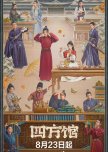Această recenzie poate conține spoilere
Refreshing blend of humor, nostalgia and melodrama
Go East follows the coming-of-age journey of Yuan Mo, a reluctant antihero who loves eating, drinking, and money but hates working. He is smart and witty, yet often runs around like a chicken with its head cut off. To earn a quick buck, he shamelessly concocts schemes. However, beneath his perceived cowardice and loudmouth behavior, the story slowly reveals a deeper trauma, adding layers to his character and hinting at an emotional backstory.
In terms of production quality, Go East featured stronger acting across the board and excelled in making the Hengdian studio sets, on-location shots, and other settings appear visually cohesive. The lighting, cinematography, camera work, and editing were all solid, working seamlessly together to complement the genre without distracting from the storytelling. Although the background music and soundtrack didn’t offer any standout tunes, they effectively accompanied the drama, subtly enhancing the overall atmosphere.
Adding to its charm, Go East evokes a sense of nostalgia, particularly for those of us who grew up watching Chinese dramas of the '90s. The comedic timing of misspoken words leading to humorous situations—like Yuan Mo wanting a new home because he’s tired of sleeping on the ground, while the realtor thinks he’s been overindulging with his maid—brings a sense of lighthearted fun. Additionally, the portrayal of political etiquette, humorously resolving interpersonal misunderstandings—such as trading Yuan Mo’s freedom for Yuqi’s transfer to Si Fang Pavilion—is delightful. When I’m not laughing outright, I’m chuckling at the absurdity of the circumstances.
However, the second half of the series takes a different turn, shifting into a palace melodrama. This change, while still engaging, detracts from the charm of the first half, which was brimming with comedy and quirky cases. As the story leaned more heavily on Ah Shu's arc, we lost much of Yuan Mo’s presence, which was one of the show's early strengths.
Tan Jianci’s decision to tackle a comedic role in his acting repertoire has undoubtedly helped expand his versatility as an actor. His portrayal of Yuan Mo, with his unruly and untamed personality reminiscent of Stephen Chow’s iconic characters, also showcases Jianci’s own talent for facial exaggerations and subtle micro-expressions, adding depth and humor to the performance.
In the end, Go East offers a refreshing blend of humor and nostalgia, making it a delightful journey for anyone who appreciates the charm of comedy dramas. Tan Jianci’s portrayal of Yuan Mo stands out as a significant step in his evolution as a versatile actor, marking this series as both entertaining and memorable.
In terms of production quality, Go East featured stronger acting across the board and excelled in making the Hengdian studio sets, on-location shots, and other settings appear visually cohesive. The lighting, cinematography, camera work, and editing were all solid, working seamlessly together to complement the genre without distracting from the storytelling. Although the background music and soundtrack didn’t offer any standout tunes, they effectively accompanied the drama, subtly enhancing the overall atmosphere.
Adding to its charm, Go East evokes a sense of nostalgia, particularly for those of us who grew up watching Chinese dramas of the '90s. The comedic timing of misspoken words leading to humorous situations—like Yuan Mo wanting a new home because he’s tired of sleeping on the ground, while the realtor thinks he’s been overindulging with his maid—brings a sense of lighthearted fun. Additionally, the portrayal of political etiquette, humorously resolving interpersonal misunderstandings—such as trading Yuan Mo’s freedom for Yuqi’s transfer to Si Fang Pavilion—is delightful. When I’m not laughing outright, I’m chuckling at the absurdity of the circumstances.
However, the second half of the series takes a different turn, shifting into a palace melodrama. This change, while still engaging, detracts from the charm of the first half, which was brimming with comedy and quirky cases. As the story leaned more heavily on Ah Shu's arc, we lost much of Yuan Mo’s presence, which was one of the show's early strengths.
Tan Jianci’s decision to tackle a comedic role in his acting repertoire has undoubtedly helped expand his versatility as an actor. His portrayal of Yuan Mo, with his unruly and untamed personality reminiscent of Stephen Chow’s iconic characters, also showcases Jianci’s own talent for facial exaggerations and subtle micro-expressions, adding depth and humor to the performance.
In the end, Go East offers a refreshing blend of humor and nostalgia, making it a delightful journey for anyone who appreciates the charm of comedy dramas. Tan Jianci’s portrayal of Yuan Mo stands out as a significant step in his evolution as a versatile actor, marking this series as both entertaining and memorable.
Considerați utilă această recenzie?

 2
2

















